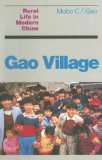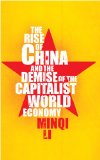Long Bow Village and Wang Jinhong Speech
I guess I’m sorry to be the speaker because we were really counting on Wang Jinhong to hold up the Chinese peasants’ end of things. He is a member of the People’s Congress of Shanxi Province. He represents his community in the Capital Taiyuan. And the meeting was impending; in fact it started on the 20th of March. And he hadn’t intended to stay into April at all when he came and we were prevailing on him and we billed him as a speaker. But as the date approached he got more and more nervous and anxious to get home and they kept calling him from home telling him all the problems that might be solved in his absence and solved against his wishes. So in the end I had to take him to Newark and put him on the plane. So unfortunate he isn’t here.
Jinhong was a great innovator. His most lasting influence on Long Bow is the industrialization of the village. They have more than a handful of rather modern factories. They have a foundry with at its height 160 people working. They had a glaze factory, making glaze for enamel of pottery; they have a cement mill; they have a pre-stressed concrete slab factory; they have a coking plant that produces 200 tons of coke a day and so on. And Jinhong has been the mastermind behind all that, but he has also been a great farm innovator and he pioneered in China an alternative to the current responsibility system that, even though it has been abandoned and suppressed and broken up, it keeps popping up all over China because it is such a rational and marvelous solution in a country where most people live in villages and share the land around them.
So what I wanted to do was to tell something about my collaboration with Jinhong in farming. And it is one of the coincidences of history that his foster parents were the first family whose home I went to the first day I joined the land reform in Long Bow Village. And his own parents were alive then. And his own mother gave him to her sister because she didn’t have any male children. So he was brought up with a different surname in a different family. And if you look back into Fanshen and that first visit to the village, this absolutely desolate hut, people without even a quilt and only straw to keep warm, and those were the people who raised him. He was so poor when he got through the five years of village school in Long Bow which was after the Revolution, he went way up to a different village, maybe 10 or 15 km away. And he had to take his own grain with him; and his own real brothers made a bag of millet for him to hang over the bicycle rack. But as he went his spokes hit the bag and when he got there the millet was all gone. And he borrowed enough for about a month and then he couldn’t go to school any more. So he never went beyond the fifth grade in school and virtually taught himself everything thereafter.
He was very smart. All his family had huge brain cases. Whether big brains means you’re smart I don’t



Where’s the rest of it?
Good question. I can’t find it anywhere else on the web. I’ll ask the others. I just changed “Jinghong” to “Jinhong” - I recently met him and found out his name is 王金宏.